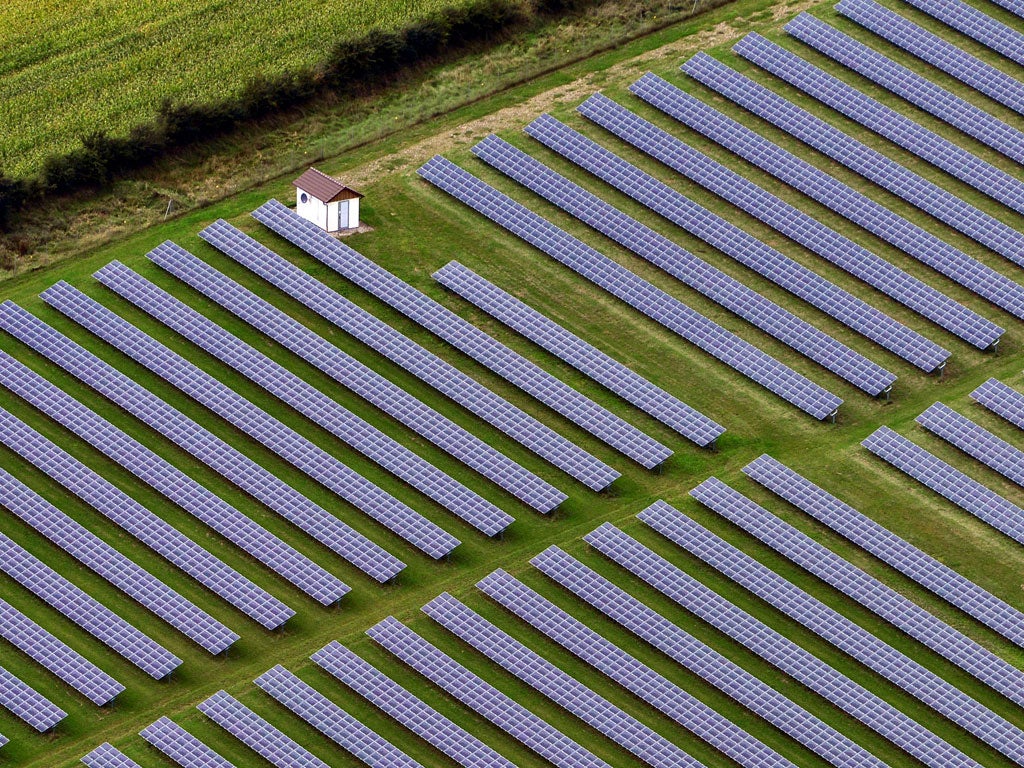Energy woes: We should replicate the best elements of Germany’s power sector transformation
Wind and solar power capacity are a key factor in driving down electricity prices

To casual and expert observers alike, UK energy policy is now in a state of disarray. The political bluster this month over energy bills is likely to have overwhelmingly negative consequences – for bills, energy security, economic recovery, competitiveness and the environment.
Political gimmicks to freeze bills, deploy windfall taxes or unravel the mechanisms through which we attract energy investment are all unpalatable. These varied and misguided prescriptions offered in turn by Messrs Miliband, Major and Cameron to try and reduce energy bills, will do no such thing, and are likely to result in the following catalogue of problems.
First, in a politically uncertain environment companies will cancel or defer the investments they can until the situation clears up. Political risk in the UK energy sector has now risen regardless of who wins the next General Election in 2015, and in the interim less investment will take place than otherwise would have been the case.
This will make the UK more energy insecure and could increase power price volatility. Moreover, by messing around with large, capital intensive investments dependent on sound policy frameworks, billions of pounds of investment in the economy will be put at risk at a critical moment of our economic recovery. This could spill over into investor sentiment in other sectors beyond energy.
Second, in addition to the prospect of deferred or cancelled projects, increased political risk will now increase the cost of capital for projects that do secure financing or need refinancing. Energy is a capital intensive and long term business and so this will have a disproportionate impact on costs and will feed back into consumer energy bills. Bills will go up, not down as a result.
Third, Mr Miliband’s commitment to a price freeze will encourage the utilities to increase their prices now to preempt the impact of prospective price freezes in the future. Sir John’s proposed windfall tax will have the same affect. If you were a company threatened in this way, you would increase prices today while you could – to get your bonuses paid, pay your dividends etc – and then hope for the best. Given recently announced price rises, it looks like the Big 6 are taking exactly this strategy. Result: bills up, not down.
Fourth, by irresponsibly ignoring the real driver of rising energy bills - the wholesale price of gas - and proposing nothing to manage our exposure to this variable, we will be no better off.
Gas prices are set in an international market with the UK being a small player. The US shale boom has widened the gap between energy costs in that country and those in Europe, giving the US a competitive advantage. Unfortunately, the UK is highly unlikely to benefit from shale gas in the same way.
Bloomberg New Energy Finance analysis show that even under the most favourable case for UK shale gas production the UK will rely on continued imports, ensuring that our gas prices remain tied to European and world markets. The direct impact of UK shale on the cost of electricity in the UK will be limited as a result.
Finally, peddling myths that ‘green levies’ are the main driver of rising bills is dishonest and cannot be good for the standard of political discourse in our country.
According to UK government figures, in 2012 3.6% of our energy bills were the result of mechanisms that drive investment in low carbon energy or tax carbon pollution, while 47% came from wholesale energy costs and 20% from network costs. Between 2010 and 2012, wholesale energy costs are estimated to have contributed at least 60% of the increase in household energy bills, while 15% was the result of energy and climate change policies.
Instead of false narratives with counter-productive policy prescriptions, we need cross-party consensus on an energy policy that is both longer term and designed to future proof us against volatile, international commodity markets over which we frankly have little or no control. We should aim to steadily drive down wholesale prices to the benefit of industry and consumers, while ensuring we do so fairly, and in a way that reduces pollution and environmental impact.
We should replicate the best elements of Germany’s power sector transformation, while ditching the excesses. The German strategy has relied on transitioning towards energy sources where marginal costs are close to zero because the sun shines and the wind blows for free. Increasing levels of wind and solar power capacity have been a key factor in driving down wholesale electricity prices in Germany. They fell from over €80 per MWh at peak hours in 2008 to just €38 per MWh today and renewable energy now supplies 22% of Germany’s electricity demand on average.
This increase in renewable power has been driven by unsustainably generous subsidies. But today the cost of renewable energy is so much lower than it was when the Germans started implementing their energy transformation. They have locked in high subsidies, but we can now secure much more ‘bang for our buck’.
We can now build renewable energy at prices that are increasingly competitive. Since 2009 the costs of onshore wind and solar PV have fallen by 15% and 44% respectively, which makes well-located renewable power cost-competitive with coal and gas without subsidy. Their costs will continue falling. This should be the story driving UK energy policy, not the current outburst of collective irrationality.
Ben Caldecott is Head of Government Advisory at Bloomberg New Energy Finance, a Programme Director & Research Fellow at the University of Oxford’s Smith School of Enterprise and the Environment, and a Trustee of the Green Alliance think tank.
Join our commenting forum
Join thought-provoking conversations, follow other Independent readers and see their replies
Comments
Bookmark popover
Removed from bookmarks